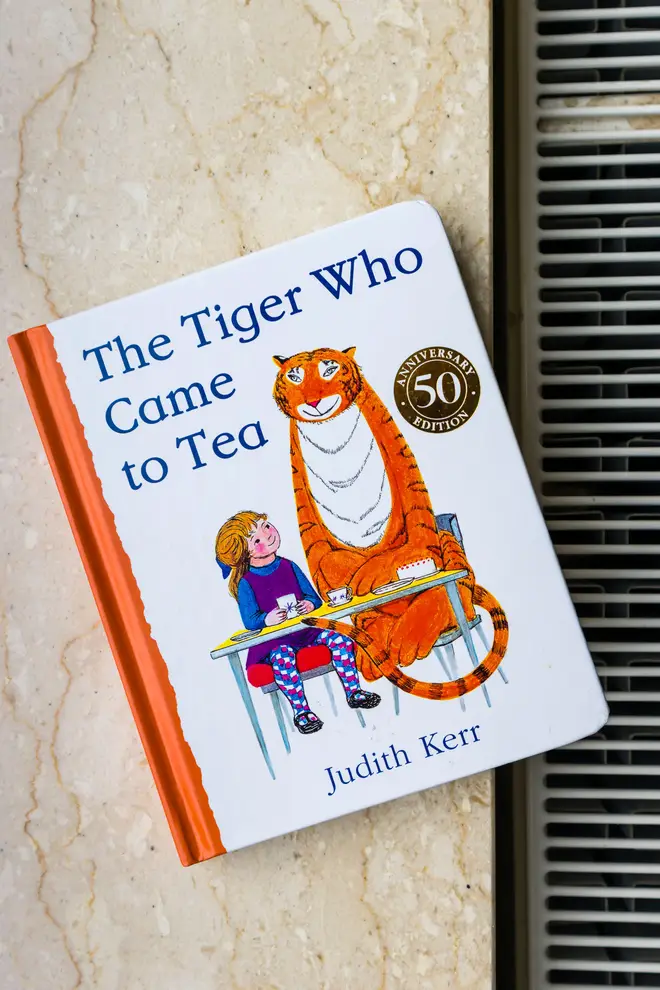
Ben Kentish 10pm - 1am
24 August 2021, 14:51 | Updated: 24 August 2021, 14:54

Popular children's book The Tiger Who Came To Tea "reinforces gender inequality" which causes violence against women and girls, a campaigner has claimed.
Rachel Adamson, co-director of Zero Tolerance charity in Scotland, said the popular Judith Kerr book reinforces gender inequality and portrays an old fashioned stereotype of women.
The book, which was originally published in 1968, tells the story of a girl called Sophie, her mother, and a tiger who invites himself to their house for afternoon tea.
The tiger eats all the food and drink they have in the house, running the taps dry and then leaving. But when Sophie's father comes home from work he takes her and her mother to a cafe.
Read more: XR protesters block Whitehall as giant pink table is dismantled by police
Read more: Airbnb to provide free housing around the world for 20,000 Afghan refugees

'These books are very gendered and have a big role to play.'
Ms Adamson claimed the storyline portrays an "old fashioned" stereotype, where the man goes to work and the woman stays at home to look after the children.
She said these stereotypes are harmful as they reinforce gender inequality, which is the "cause of violence against women and girls, such as domestic abuse, rape and sexual harassment".
Human rights barrister, Dr Charlotte Proudman, said these children books are "gendered in nature" and do have a big "role to play".
She told Nick Ferrari on LBC: "It's all about having a conversation about more harmful gender stereotypes and traits that are played out within children's books.
"For example, Sleeping Beauty, waiting for the prince to come and wake up this beautiful young woman and bring her back to life, or Cinderella to be rescued from her evil stepmother and sisters, and only a prince of course can do that. Or the Little Mermaid desperately longing after a man.
"These types of books, which of course I grew up with, are very gendered in nature and I do think that they had quite a big role to play in terms of my understanding of beauty, needing a man, having someone to fulfil that void, so to speak."

Everyone’s Invited founder Soma Sara talks about 'rape culture'
She said gender-based stereotypes, domestic abuse, and all forms of harmful behaviour often start off when children are very young.
"If you tackle it when children are very young then hopefully you have a better idea as you get older," she said.
"That's the whole idea of zero tolerance, change it while they are young and you can mold their mindsets and their attitudes and make them respect and care for each other.
"All the princes that rescue the women are all men, and all the nasty, evil characters are men and the helpless ones that need rescuing are all female. That's the kind of message these books are sending out to our youngsters.
"I certainly don't want children to grow up with that kind of message.
"I want them to grow up and think that men and women are equal and that women are as strong as men, and they can get themselves out of tricky situations, or they can be supported, and vice versa."
Zero Tolerance said "children learn by example", and look for characters that resemble themselves.
It said that hearing story after story in which male characters are always leading 'Mr Fix-it', adventurous roles, and female characters are in 'princesses that are needing to be saved' or supportive, caring roles, this sends out the message that these gender roles are predetermined.
"This limits their ideas of what they can be and achieve," they said.
"The stories we tell our children are so influential in shaping children’s understanding of the world and their future in it."
Read more: Gay and bisexual men earn less than heterosexual men - study
Read more: 'Rape is the consequence of a culture where sexist behaviours are normalised'
Zero Tolerance's findings were part of its You Can Be Campaign - which aims to improve gender equality and diversity in children's environments.
Twenty-one nurseries from across Scotland audited more than 3,000 books in their nursery libraries as part of the campaign.
Only 14% (three out of 21) book collections passed the gender and/or diversity audit.
To pass the audit, the nursery's book collection had to have more books that don’t promote gender stereotyping and/or other forms of inequality than books which do.